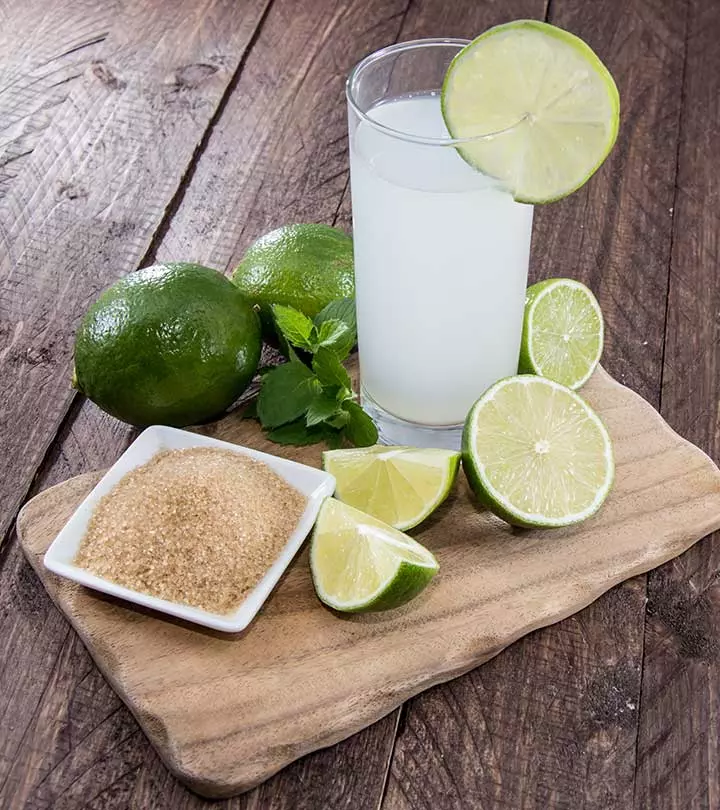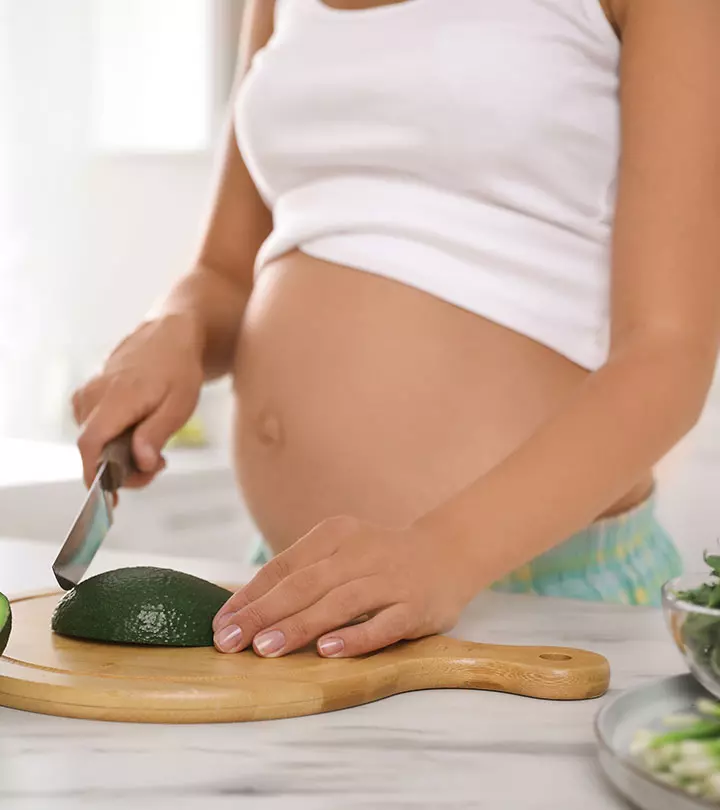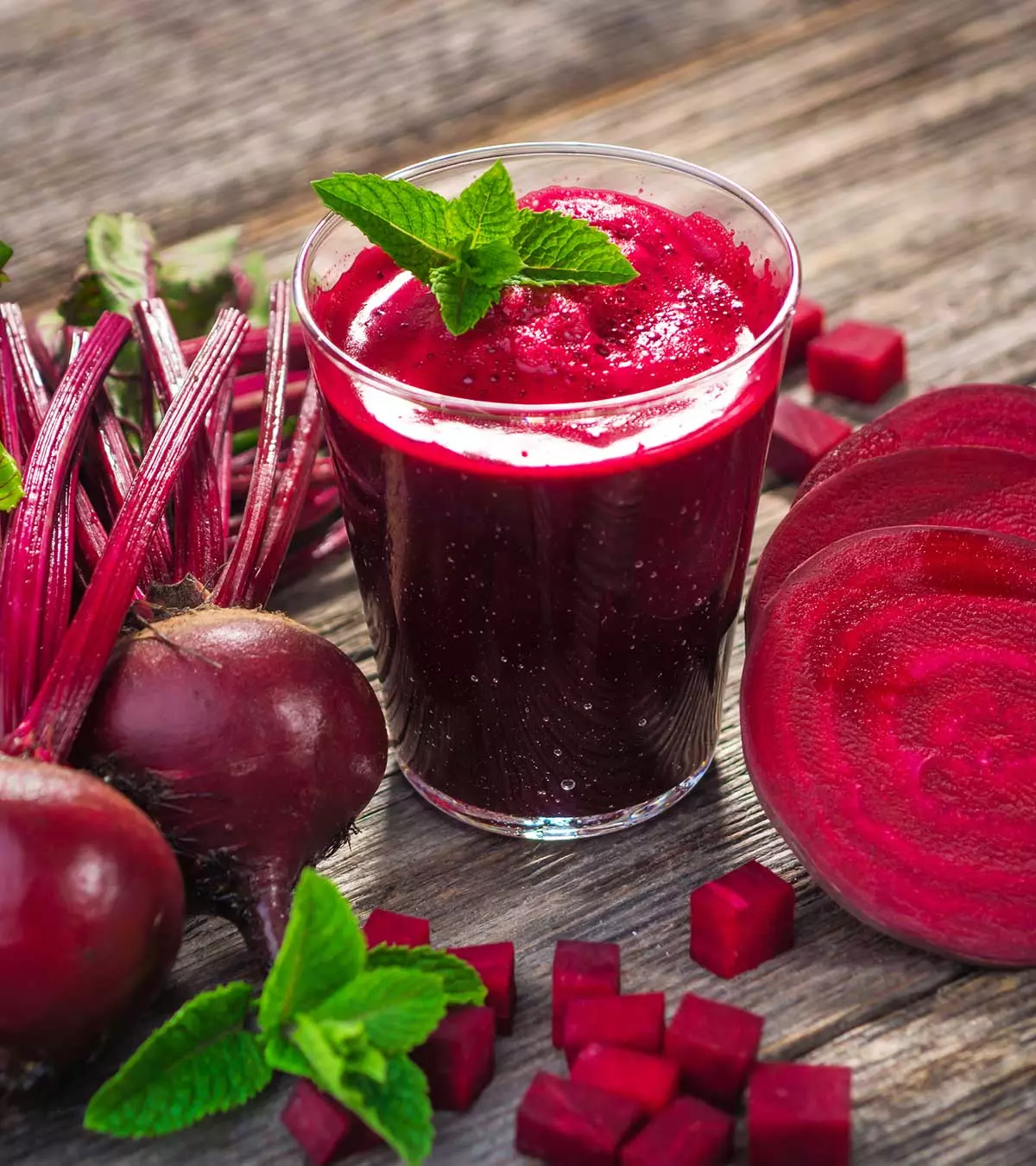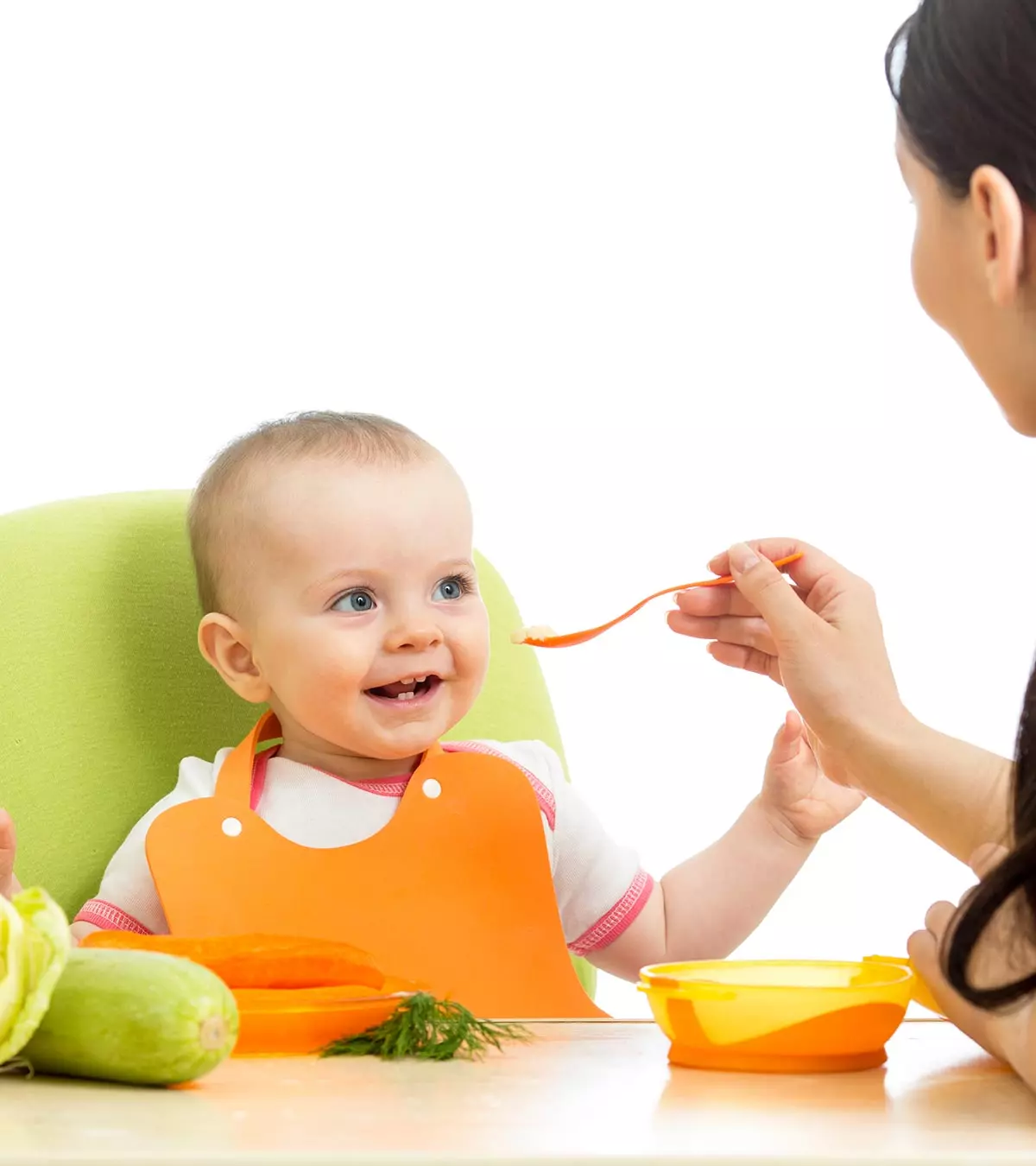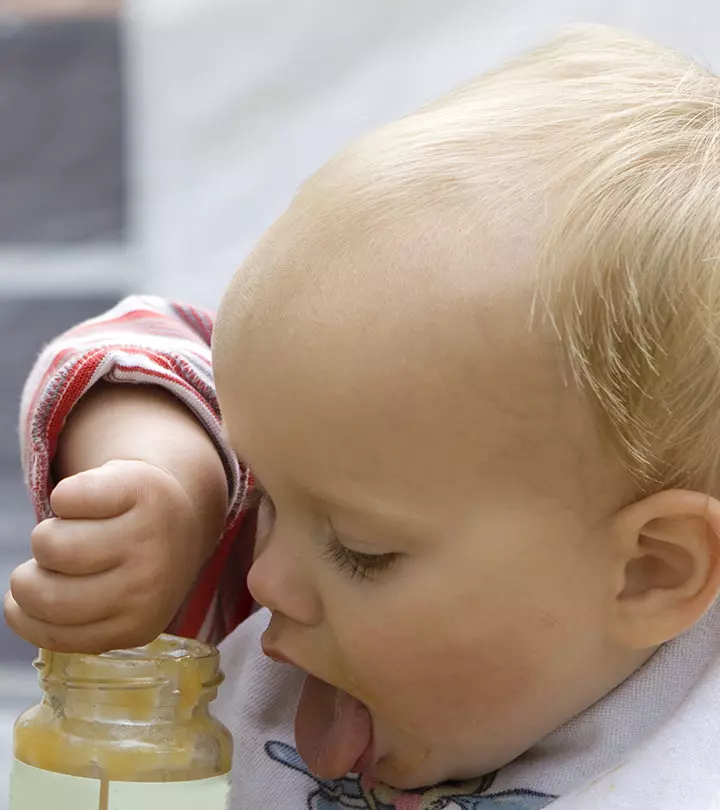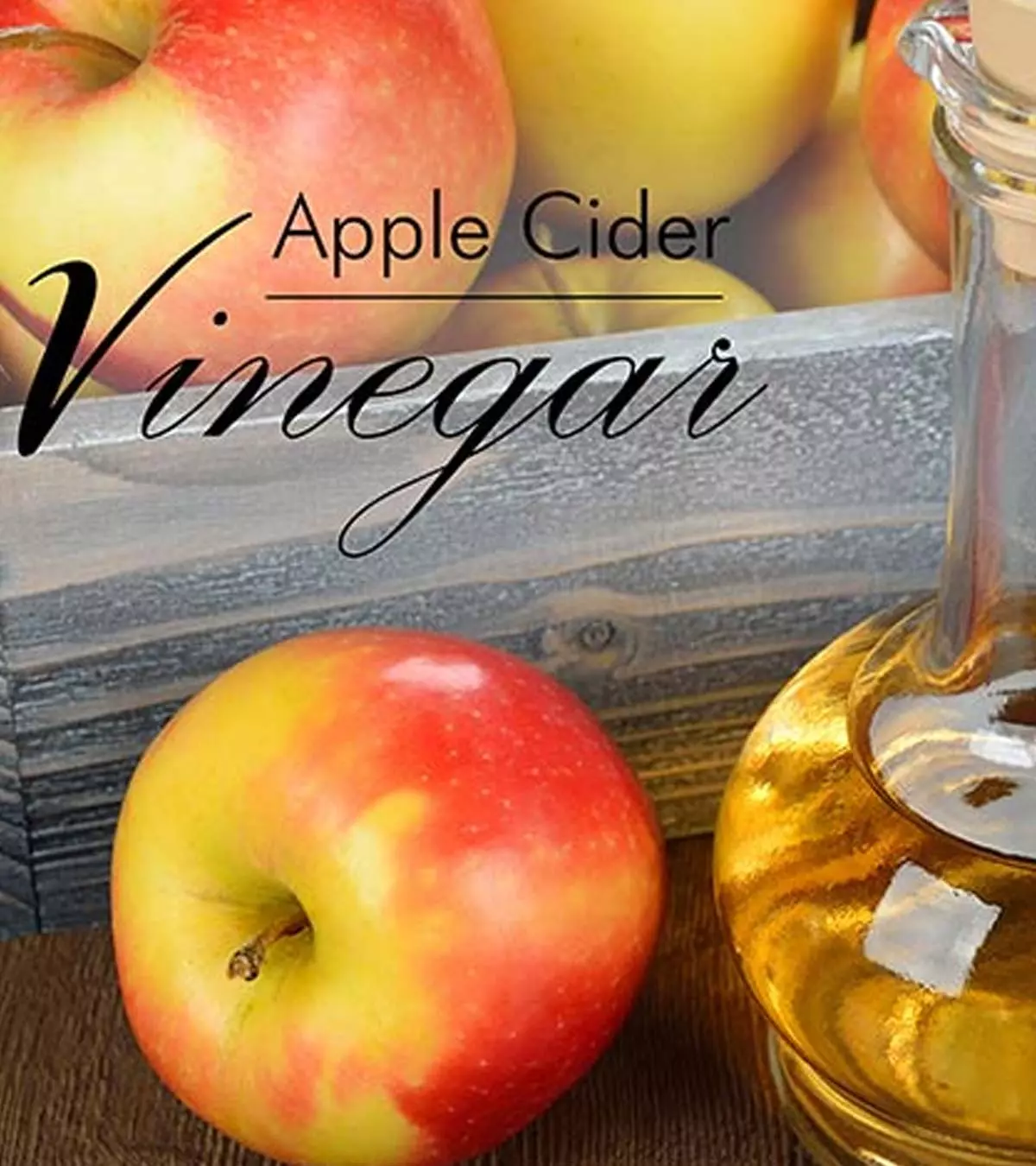
Image: ShutterStock
Grapefruits are known for their peculiar bittersweet to sour taste. However, grapefruit for infants can greatly add to their diets due to its rich nutritional value. With the several varieties of this fruit available, you may add this fruit in various ways to a baby’s weaning diet. Some grapefruit varieties like the Marsh, Thompson, and the Ruby are considered suitable for babies as they are sweeter, seedless, and less acidic (1). Though the grapefruit is super nutritious, you may have to follow certain precautions while feeding it to your baby. Reading this post could help you understand the possible health advantages, side effects, and interesting ways to feed grapefruits to your baby.
Key Pointers
- It is not recommended to give citrus fruits, like grapefruit, to babies who are under one year old.
- Grapefruits are a great source of essential nutrients that are beneficial for babies who are 12 months or older.
- Giving grapefruit to babies can help with hydration, boost their immune system, and promote gut health.
- However, feeding a baby too much grapefruit may damage their teeth or have interactions with certain medications.
- Seeking medical advice and serving the fruit fresh and age-appropriately can help ensure maximum benefits.
Can Babies Eat Grapefruits?
Generally, babies are recommended to avoid citrus fruits before 12 months of age as they are acidic and may cause a rash. However, you can introduce grapefruit to your baby’s weaning diet before 12 months after consulting a healthcare professional. It will ensure that the introduction of grapefruit is carefully analyzed and adequately planned for your baby’s health and well-being.
While it’s best to encourage your toddler to consume whole fruits, you can occasionally offer small amounts of grapefruit juice to them.
However, the American Academy of Pediatrics advises against the use of grapefruit juice if the infant is on certain drugs, such as calcium antagonists, cisapride, and ciclosporin, to name a few. Grapefruit juice alters drug absorption and bioavailabilityiThe rate and degree to which a substance is available for absorption and assimilation in the body. (2). If your infant is on any medication, then seek medical advice before feeding grapefruit and its products to the baby.
Nutritional Value Of Grapefruits
The juicy pulp of grapefruit is a good source of vital nutrients, like vitamins A and C, and potassium. Besides, it contains several phytochemicalsiNatural chemicals produced by plants that help prevent diseases and promote good health. , like lycopeneiA natural antioxidant pigment found in plants, which imparts characteristic (red) colors to certain fruits and vegetables. and naringin (3). Therefore, grapefruit can be added to your baby’s balanced diet for adequate nourishment.
100 grams of grapefruit (whole fruit) can provide the following amounts of nutrients against the recommended intake of the nutrients per day (4) (5).
| Name | Amount | RDA |
|---|---|---|
| Water | 90.5g | – |
| Energy | 33Kcal | – |
| Fiber, total dietary | 1.1g | – |
| Sugars, total including NLEA | 7.31g | – |
| Calcium, Ca | 12mg | 270mg (7-12 months) |
| Magnesium, Mg | 9mg | 75mg (7-12 months) |
| Phosphorus, P | 8mg | 275mg (7-12 months) |
| Potassium, K | 148mg | 700mg (7-12 months) |
| Vitamin C, total ascorbic acid | 33.3mg | 35mg (7-12 months) |
| Folate, total | 10µg | 32µg (7-12 months) |
Sources: U.S. Department of Agriculture and World Health Organization
Possible Health Benefits Of Grapefruit For Infants
Here are a few benefits that babies and toddlers can have by consuming grapefruit regularly as a part of a well-balanced diet.
- Provides hydration: Grapefruit’s high water content and the presence of electrolytes, such as potassium, can provide adequate hydration. It may help protect the little one from dehydration.
- Supports gut health: The fruit contains a significant amount of water and dietary fiber that may help keep the baby’s bowel active and support digestion. Besides, it contains bio active compounds, such as phenols and flavanones, that may help boost gut microbiota (6) (7).
- May boost immune health: Grapefruit contains several nutrients such as vitamins A and C that enhance immunity. It also contains active compounds, like flavonoids, that exhibit antioxidant and anti-inflammatory properties (8) (9).
- May support heart health: Certain observational studies demonstrated the cardio protective effects of grapefruit. Most of these effects are attributed to grapefruit pectin, a form of soluble dietary fiber, and some bioactive compounds, such as hesperidin and naringenin. These substances are reported to lower blood pressure and improve the lipid profileiThe quantity of cholesterol and other fats in the body, measurable through a blood test. , thus improving heart health (10).

Image: Shutterstock
Grapefruit also contains compounds, such as lycopene and limonoidsiCompounds that are predominantly present in citrus fruits such as lemons. , that keep the skin healthy and contribute to the overall growth and development.
 Research finds
Research findsPossible Side Effects Of Grapefruit For Babies And Toddlers
Grapefruit and grapefruit juice can have certain side effects (11) (12).
- Interaction with medicines: Grapefruit and its juice contain substances that inhibit the functioning of an enzyme the body uses to metabolize certain medications. Eating grapefruit while taking these medications could cause an overdose and other adverse effects. Drugs such as some antibiotics, cardiovascular drugs, central nervous system (CNS) drugs, gastrointestinal drugs, and immunosuppressantsiDrugs or agents that suppress the immune system function and help treat certain autoimmune conditions. can interact with grapefruit.
- Tooth enamel damage or erosion: Excess consumption of grapefruit may lead to tooth enamel erosion due to the high amounts of citric acid in it. If your baby or toddler is getting new teeth and feels sensitive in the teeth, then stop giving grapefruit for a few days to see if there is any improvement.
- Choking hazard: Grapefruit segments may pose a choking risk for infants and toddlers, so ensure they are properly prepared and served in age-appropriate forms.
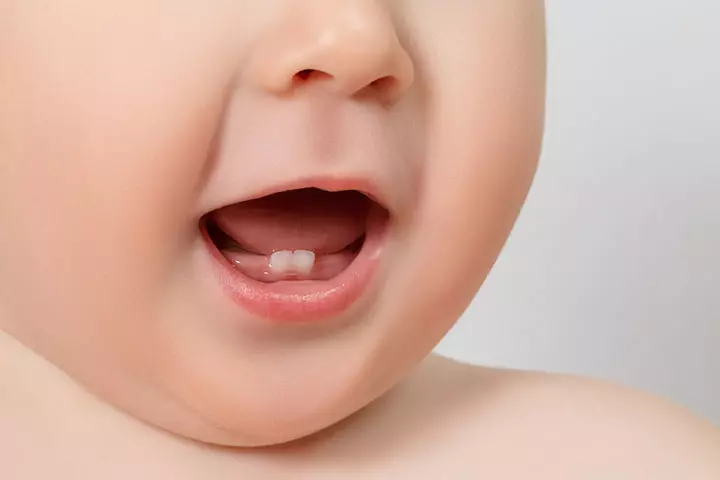
Image: IStock
Precautions To Take While Feeding Grapefruit To Infants
It is good to follow these precautionary steps to ensure the safe and effective consumption of grapefruit.
- If there is a history of citrus fruit allergy in your family, then consult a pediatrician before including grapefruit in your infant’s daily diet.
- Consult a doctor if your baby has gastric reflux. The high acidic content of grapefruit may aggravate the condition.
- Do not include any new food while introducing grapefruit. Follow a “three to five-day wait” rule to check for any signs of intolerance, sensitivity, or allergy.
- Introduce no more than a teaspoon or two of grapefruit puree or mash. Increase the amount gradually once your baby seems comfortable with the food.
- Prefer fresh grapefruit. Check the taste before serving since sometimes grapefruits can have an extremely bitter taste.
- Prepare age-appropriate recipes to feed grapefruit to your baby in several ways. For instance, you may give your toddler a thick slice of seedless grapefruit to suck on during snack time. However, when you do so, clean the fruit peel properly and ensure it tastes sweet.
- For toddlers, prefer to use whole fruit in preparing several recipes like broiled grapefruit with yogurt.
- Always keep the intake of grapefruit and its products, like juice, in moderation. Excessive consumption of grapefruit might suppress appetite.
- Avoid feeding packaged or canned grapefruit juice to your toddler as it has high amounts of added sugar, which is a source of empty calories.
Is It Safe For Infants To Consume Grapefruit Juice?
Fruit juice is not recommended for babies below one year, according to the American Academy of Pediatrics. They should not be given any fruit juice, including grapefruit juice (14). Juices cannot offer nutritional benefits and displace important nutrients and minerals.
Moreover, fruit and vegetable juices for babies with high sugar content can raise the likelihood of dental cavities. The carbohydrate composition can also lead to diarrhea when given excessively (15). Therefore, waiting until the baby reaches at least one year is advisable before introducing small amounts of fruit juice into their diet. Even then, it should be consumed in moderation as part of a well-balanced meal plan.
How To Select And Store Grapefruits?
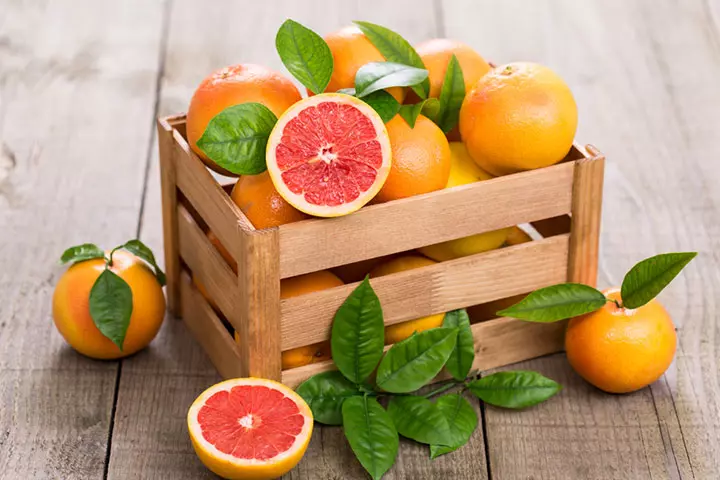
Image: Shutterstock
Steps to select grapefruits
- Prefer organic grapefruits from a certified organic store.
- Buy only ripened grapefruits as they do not ripen once harvested.
- Choose a fruit that has shiny skin and feels heavy for its size.
- Avoid grapefruits that have soft spots or look water-soaked.
- Mild bruising is okay. However, avoid grapefruits with several bruises, blemishes, or other visible damage on the skin.
Steps to store grapefruits
- After purchase, clean the grapefruit with a moist cotton cloth to remove the dust and dirt that might be present on the peel.
- You can store grapefruits at room temperature, away from sunlight, for a week.
- Store it in the crisper drawer of the refrigerator if you wish to store the fruit for longer.
- Do not store half-cut grapefruit in an open container in the refrigerator. Preferably use the whole fruit at once. However, if you intend to store it, then do so in a BPA-free plastic container for no longer than two days.
Delightful Grapefruit Recipes For Babies And Toddlers
Grapefruit has two main varieties – yellow and pink grapefruit, which vary in taste and nutritional content. However, you can use both varieties to prepare several recipes. It will not only provide nutrients but will also add color to the meal. Here we give two basic recipes that you may try for your infant.
1. Grapefruit puree
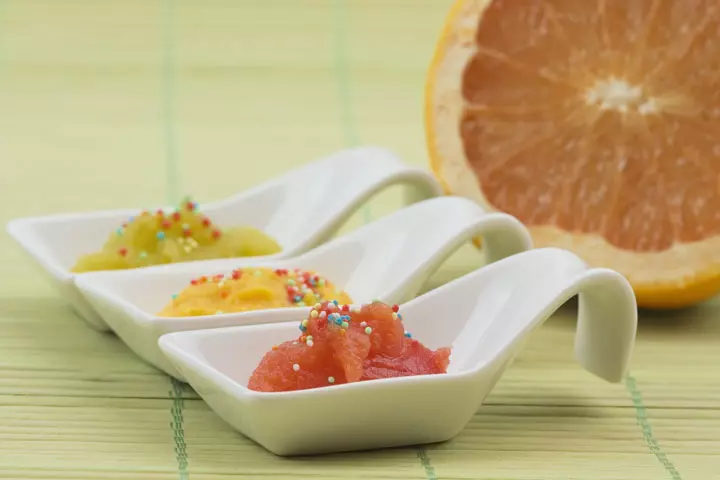
Image: IStock
This is the most basic recipe to begin feeding grapefruit to your baby. You may enhance this recipe by adding yogurt and other fruit purees with dry fruit powder once your baby is about eight months old.
You will need:
- 1 grapefruit (ripe and seedless)
- 1 cup water
- ½tsp honey (optional)
How to:
- Take a grapefruit and cut it into two halves.
- Remove the peel carefully so that only the pulp is left behind.
- Now cut the grapefruit halves into small pieces and put those pieces into a blender.
- Blend until you get a smooth paste. Add water to adjust consistency.
- Transfer the puree into a bowl. Remove any lumps or thick pieces that might be present.
- Serve it immediately. You may add honey if you feel that the puree is a bit tart or tangy for your baby.
 Quick tip
Quick tip2. Grapefruit and strawberry smoothie

Image: Shutterstock
The delectable recipe includes a blend of fruits and coconut water, making the recipe versatile and rich in nutrition.
You will need:
- 1 grapefruit (peeled, de-seeded)
- 2 cups strawberries (chopped)
- 1 cup coconut water
- ½ in piece fresh ginger (peeled and chopped)
How to:
- Take the grapefruit and chop it into small pieces.
- Now put all the ingredients in a blender and blend until you get a smoothie of smooth flowy consistency.
- Serve it to your baby immediately for breakfast or store it in the refrigerator and let it chill before serving.
There are many different ways in which you can serve grapefruit to your baby. Here are some tips to help you prepare an age-appropriate recipe.
- 100% real grapefruit juice is tart, and you can mix it with other fruit juices, such as orange juice or apple juice. This will help add natural sweetness to the juice, making it palatable.
- Grapefruit shake, ice cream, and sorbet are some of the high-calorie recipes that can be added to bring in more flavor and textures to your baby or toddler’s diet.
- Add some grapefruit slices to a vegetable or fruit salad. Sprinkle finely chopped walnuts or crumbled cheese before serving. This is an ideal way to develop healthy eating habits in your toddler.
- You may also try recipes by baking, roasting, and broiling grapefruit. These recipes can be a part of your baby’s diet once they are around ten months of age.
Frequently Asked Questions
1. Can grapefruit be given to infants with diabetes?
There are no contraindications to feeding grapefruit to babies with diabetes. Grapefruits are even known to benefit those with diabetes (16). Nevertheless, consult a pediatrician first, especially if your baby is on diabetes medication.
2. Can grapefruit be given to infants with high blood pressure?
Grapefruit, due to its rich fiber content and anti-inflammatory properties, may be beneficial in reducing high blood pressure (17).
3. Can grapefruit be given to infants with kidney problems?
Research indicates that grapefruit juice, because of its citric acid content, may help prevent calcium kidney stones (18). However, infants with kidney problems require careful management of their diet. Thus, consult a pediatrician before serving grapefruits to babies.
The American Academy of Pediatrics advises against giving grapefruit juice to babies on drugs such as cyclosporin or calcium antagonistsiA class of medicines that are used to treat hypertension and heart-related ailments. since the fruits may interact with the drug and cause unpleasant side effects. However, on the other hand, grapefruit for infants, is a rich source of vitamins, nutrients, and fibers. Therefore, it is advised to consult your doctor before giving grapefruit to your child to understand if there are cases of citrus fruit allergy in the family or if your baby has signs of gastric reflux.
Infographic: Precautions To Take When Feeding Grapefruit
If you must give grapefruit to your baby, be sure to peel it, remove the seeds, and cut it into small pieces to avoid the risk of choking. Refer to the following infographic for more helpful tips on feeding grapefruit to your infant. Save it and share it with other parents to ensure the safety and health of their little ones. Illustration: Momjunction Design Team
Illustration: Can Babies Eat GrapeFruit? Health Benefits And Recipes

Image: Stable Diffusion/MomJunction Design Team
References
1. Grapefruit; Better Health; Victoria State Government
2. The Use and Misuse of Fruit Juice in Pediatrics; American Academy of Pediatrics
3. Mary M. Murphy et al.,Consumption of grapefruit is associated with higher nutrient intakes and diet quality among adults, and more favorable anthropometrics in women, NHANES 2003–2008; NCBI
4. Grapefruit, raw, white, all areas, FDC ID: 174676; Fooddata Central; USDA
5. Feeding and nutrition of infants and young children; WHO
6. TugbaOzdalet al.,The Reciprocal Interactions between Polyphenols and Gut Microbiota and Effects on Bioaccessibility; NCBI
7. Yala Stevens et al.,The Intestinal Fate of Citrus Flavanones and Their Effects on Gastrointestinal Health; NCBI
8. Sergei V. Jargin; Grapefruit: Some perspectives in pharmacology and nutrition; NCBI
9. Un Ju Jung and Sang Ryong Kim,Effects of naringin, a flavanone glycoside in grapefruits and citrus fruits, on the nigrostriatal dopaminergic projection in the adult brain; NCBI
10. Peter MO Owira and John AO Ojewole,The grapefruit: an old wine in a new glass? Metabolic and cardiovascular perspectives; NCBI
11. The Grapefruit Juice Effect; Touro College And University System
12. David G. Baileyet al., Grapefruit–medication interactions: Forbidden fruit or avoidable consequences?; NCBI
13. Grapefruit: Think Antioxidants, Not Fat-Burning; The American Institute for Cancer Research
14. Where We Stand: Fruit Juice for Children; HealthyChildren.org
15. Fruit Juice in Infants, Children, and Adolescents: Current Recommendations; American Academy of Pediatrics
16. Grapefruit; Defeat Diabetes Foundation
17. Grapefruit Benefits; John Hopkins Medicine
18. A. Trinchieri et al.; Effect of acute load of grapefruit juice on urinary excretion of citrate and urinary risk factors for renal stone formation; Digestive and Liver Disease
Community Experiences
Join the conversation and become a part of our nurturing community! Share your stories, experiences, and insights to connect with fellow parents.
Read full bio of Dr. Orlena Kerek
Read full bio of Swati Patwal
Read full bio of Rohit Garoo
Read full bio of Vidya Tadapatri









